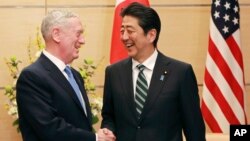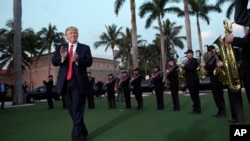Japanese Prime Minister Shinzo Abe is expected to continue to seek closer U.S. ties on security and trade, and to nurture a personal relationship with President Donald Trump when the two leaders meet for the second time in Washington on Friday.
“(Trump is) a business man that places a lot of emphasis on personal relationships, which is why during his first visit Mr. Abe gave Trump this extraordinarily expensive golf club. That’s why they’re going to play golf together on this visit,” said James Brown, an associate professor of international affairs at Temple University’s Japan campus.
Trade deal
Abe wants to secure a bilateral trade deal with the U.S. to replace the multilateral Trans Pacific Partnership free trade agreement that Trump has rejected.
Trump named Japan along with China and Mexico as countries that unfairly benefited from trade polices that caused a U.S. trade deficit, and accused Tokyo of improperly devaluing its currency to boost exports.
Japan posted a trade surplus of 6.8 trillion yen with the United States last year, down 4.6 percent from 2015, but U.S.-bound car shipments rose for a second straight year, according to Japanese Finance Ministry data.
While Trump is an experienced businessman, Brown said, Tokyo is concerned that his view of trade is narrow and his understanding of the extent of economic inter-dependence is limited.
“He does seem to regard trade as zero sum. He seems to think that it’s either the case that the U.S. wins or it’s negotiating partner wins. He doesn’t seem to accept trade is actually a positive sum issue where both sides can actually gain,” Brown said.
Abe will reportedly bring his finance and foreign affairs ministers to offer the Trump administration an investment package that could create 700,000 American jobs through private-public investment in infrastructure such as high-speed trains.
The Toyota Motor Corp. and other major Japanese companies may also announce new investments to build manufacturing plants in the U.S. as a result of the summit.
Security concerns
Offering Japanese economic concessions is being seen by many in Tokyo as a means to ensure the U.S. military alliance.
Trump alarmed leaders in Tokyo during the campaign when he suggested he might withdraw troops and disengage from mutual defense treaties, unless U.S. allies pay significantly more for American protection.
Japan hosts more than 50,000 American troops and is highly dependent on the U.S. to deter and defend against China’s rising military might and North Korea’s growing nuclear threat.
The president however has downplayed his criticisms in follow-up meetings and phone calls with leaders, saying the U.S. would live up to its commitments in the region.
And U.S. Defense Secretary Jim Mattis strongly reassured Japan and South Korea during his visit to the region last week, emphasizing continued support for U.S. alliances, warning North Korea that any attack would be met with overwhelming force, and promising to maintain a strong military presence to counter China’s aggressive behavior in the South China Sea.
Mattis also called Japan “a model of cost sharing, of burden sharing,” downplaying any need to radically change cost-sharing agreements in place.
Tokyo reportedly pays more than $1.6 billion to Washington to support American troops, in addition to other base construction costs and support. The U.S. spent $5.5 billion in 2016 on its bases in Japan, according to the Pentagon.
Grant Newsham, a senior research fellow at the Japan Forum for Strategic Studies in Tokyo, says Abe is prepared to commit more funding to build up the Japanese Self-Defense Forces (JSDF), but not to pay more to Washington.
“From Mr. Abe’s perspective, he is really hoping that Mr. Trump does not pressure him to spend more money in support of U.S. forces in Japan. I think he is expecting Mr. Trump to ask for Japan to spend more money on its own forces, on its own JSDF. And I think he’s ready for that,” Newsham said.
Newsham says the Japanese prime minister would also resist any U.S. pressure to move beyond its traditional nonthreatening defense posture and further antagonize China by participating in joint freedom of navigation patrols in the South China Sea.
Youmi Kim contributed to this report.










